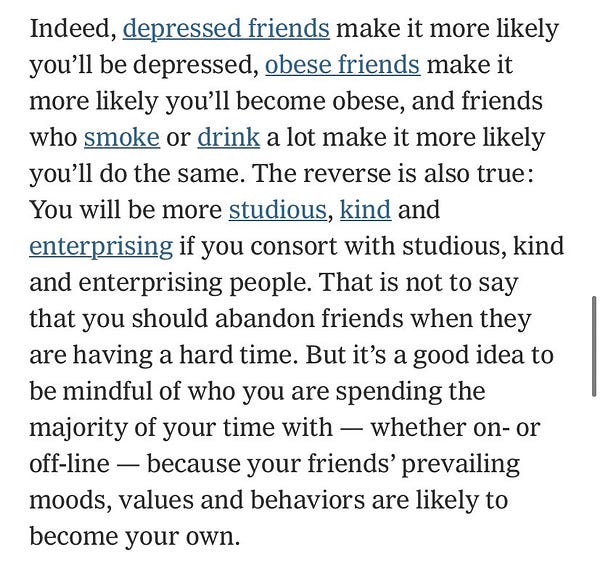The New York Times Can’t Stop Giving Us Weird, Cruel Advice About Our Friends
Being fat is bad, and so is being friends with fat people, because you might also get fat because of them — everyone knows this.
Stop me if you've heard this one before! The New York Times has published a piece of written work that goes out of its way to say something bigoted about a marginalized group of people.
I'm specifically writing about an article by Kate Murphy entitled "How to Rearrange Your Post-Pandemic ‘Friendscape'" which was published earlier this week. In the piece, Murphy guides her readers on the delicate art of assessing friendships to determine which ones no longer serve them, and which ones they still feel worthy of further investment in. And, to her limited credit, she does present this alternate reality to readers: if you look inward, perhaps you'll find that you are the shitty friend who no one wants to keep up with.
Readers may recall Murphy's work from the last time she wrote about friendship for the Times, in a piece called "The Pandemic Shrank Our Social Circles. Let’s Keep It That Way." The article featured a deranged-seeming doctor who, with Murphy's seeming approval, treated his friendships during the pandemic like plants on a watering schedule. It also featured Murphy's recommendation that we all use the pandemic to semi-permanently, if not permanently, redefine our social circles. Real "I value my friends only as much as I can exploit the goodness of their hearts for my own self-gain" vibes.
Alas, Murphy's first friendship piece, perhaps even tame compared to her most recent banger, did so well with the hate reads that the Times brought her back to double down on this concept of cutting your friends list. Only, this time, she added a little fatphobia.
Here's an excerpt, highlighted by Adam Johnson, co-host of the Citations Needed podcast. Unsurprisingly, I found myself thinking, ha ha ha, what in the fuck!


Uhhh, lol, what! Lots of stuff going on here, I see. Let's go over that again. For context, Murphy is writing about the concept that most people only have time to have 4-6 "foreground friends," the people closest to you that you interact with daily or weekly. Here's that specific graf of Murphy's article, including part of the graf before it — on friendship, might I remind you, dear reader — emphasis mine:
Because they are front and center, foreground friends are the ones who have the most profound impact on your health and well-being, for good or ill.
Indeed, depressed friends make it more likely you’ll be depressed, obese friends make it more likely you’ll become obese, and friends who smoke or drink a lot make it more likely you’ll do the same. The reverse is also true: You will be more studious, kind and enterprising if you consort with studious, kind and enterprising people. That is not to say that you should abandon friends when they are having a hard time. But it’s a good idea to be mindful of who you are spending the majority of your time with — whether on- or off-line — because your friends’ prevailing moods, values and behaviors are likely to become your own.
I mean, there's only one way to interpret what Murphy is saying here: friends affect you for better or worse, and you could end up like your depressed and fat friends, or you could end up like your kind and ambitious and hard-working friends. And these two groups of people are very different and don't intersect! In fact, they are "reverse," lol. Pay no mind that your friend suffers from depression: they are less worthy of your time because they could depress you! And talking about fat people as unkind, lazy, and dumb? Lol, big surprise.
I'm even more amazed at her clarification: no, don't be a shitty friend and abandoned your fat and depressed friends just because they're "having a hard time" — because depression is temporary and difficult, and fatness is a difficult, temporary existence, too. And you should still show up for your friends during their struggles with fatness. But just know that you're likely to take on whatever "moods, values and behaviors" that led these friends of yours to become diagnosed with depression, or to become fat. Because everyone knows these three factors influence depression and being fat, of course.
Ultimately, this all makes one gigantic, intolerant point: that depression and fatness are inherently bad, and to have depression or to be fat is to possess inherently negative moods, values and behaviors. Don't dump your fat friends, but be warned that you could become fat as they are, because that would actually be the worst thing in the world — being fat.
Again, none of this is surprising — this is run-of-the-mill stereotyping that both fat and thin people have likely internalized their entire lives. If people weren't so afraid of being fat and didn't think being fat is bad, there wouldn't be an entire multi-billion dollar industry dedicated to various grifts that promise thinness. It's not even surprising that these ideas are printed in the Times. But I guess what is surprising is that they somehow wormed their way into an article about, of all wholesome things, friendship!
After seeings these tweets, I went to the article at hand and read it top to bottom (as well as Murphy's original friendship article). And other than this weird fatphobic comment, it's mostly innocuous, except for these two sentences in the third graf of the intro, which make explicit negative connotations with binge eating (and buffets), and positive connotations with, I don't know, eating a healthy friendship salad with a side of friend soup, or something:
As pandemic restrictions ease in the United States and we may once again belly up to an all-you-can-eat buffet of social activity, the question is: Will we pile our plates and gorge, or be more selective and stick to what nourishes and sustains us?
But still, the rest of this piece is pretty normal. Murphy gives tips on how someone can determine if they're in a one-sided friendship, or if they have friends who make them feel shitty about themselves, and on how they can self-assess their own self-absorbed anti-friendship behavior. No other comments about fat people and negative traits. And without that graf, this piece would have been Fine! Good, even.
But no, fatphobia dressed up as "I just really care about your health" prevails, as it does in every narrative about fatness and fat people. In an article about shitty friends, and when to dump them! Of all pieces! Fatphobia is everywhere, normalized, under the radar and undetected while shrouded in the best of intentions, and if that quip about fat people and friendship isn't a perfect example of that, I don't know what is.





